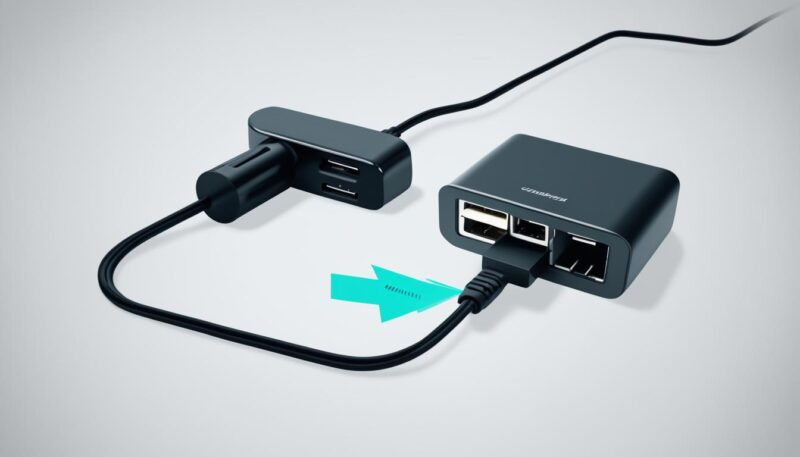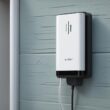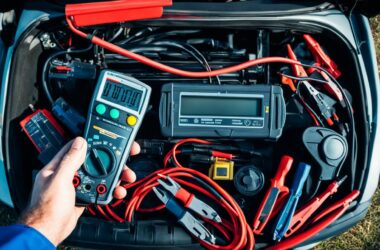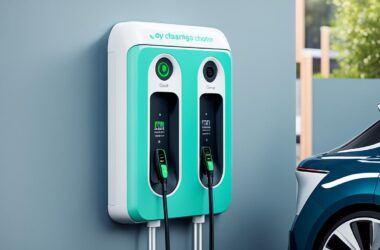As an EV owner, you may have encountered the need to adapt a large pin charger to a small pin for car charging. Whether you’ve recently upgraded your vehicle or need to use your charger with a different car, it’s essential to find a solution that allows compatibility without the need for costly replacements.
One option to make this transition is by using a charger pin adapter. These adapters are designed to resize the charger pin, making it compatible with a smaller pin size found in car charging ports. By utilizing a charger pin adapter, you can continue using your existing charger and avoid the need to invest in a new charging cable or accessory.
Alternatively, if you feel confident in your DIY skills, you can modify the car’s charging port to accommodate the larger pin. This option requires careful consideration and adherence to proper steps to ensure safety during the charging process.
It’s important to note that when making any modifications to the charger pin or the car’s charging port, you should prioritize safety. Follow recommended guidelines and consult professional advice if needed to ensure that the modifications are done correctly and securely.
Key Takeaways:
- Adapting a large pin charger to a small pin for car charging can be achieved through a charger pin adapter or modifying the car’s charging port.
- Using a charger pin adapter allows you to continue using your existing charger without the need for a new charging cable or accessory.
- Modifying the car’s charging port should be done carefully, prioritizing safety and following proper steps.
- Consult professional advice if needed to ensure that the modifications are done correctly and securely.
Using an Extension Lead for Large Pin Chargers
Adapting a large pin charger to a small pin for car charging can be a necessary modification for many electric vehicle (EV) owners. One option to achieve this is by using an extension lead. This method allows you to connect your large pin charger to your car’s small pin charging port, enabling you to continue using your existing charger without the need for a new one. However, there are important considerations to ensure a safe and efficient charging process.
Choosing a Quality Extension Cable
When using an extension lead, it is crucial to select a good quality cable that can handle the current required for charging your EV. Look for an extension cable that is marked with a suitable amp rating, such as “3G1.25mm2” for 13 amps or “3G1.00mm2” for 10 amps. These ratings indicate the cable’s ability to carry the necessary electrical load without overheating or causing damage.
Ensuring Safety During Charging
It is important to fully unwind the extension lead during charging to allow heat to dissipate effectively. This helps to prevent overheating and reduces the risk of electrical hazards. Regularly checking the plugs, sockets, and cables for signs of overheating or damage is also recommended to ensure safe and reliable charging.
Tip: Always follow the manufacturer’s instructions and guidelines when using an extension lead for charging your EV.
While using an extension lead may not meet official regulations, many EV owners have successfully utilized this method on occasion without any issues. However, it is crucial to exercise caution and monitor the charging process closely to ensure the safety of both the charger and your vehicle.
| Advantages of Using an Extension Lead | Disadvantages of Using an Extension Lead |
|---|---|
|
|
Remember, using an extension lead for your large pin charger is just one of the options available to adapt it to a small pin charging port. It is essential to assess the compatibility, safety, and long-term suitability of this solution for your specific EV charging needs.
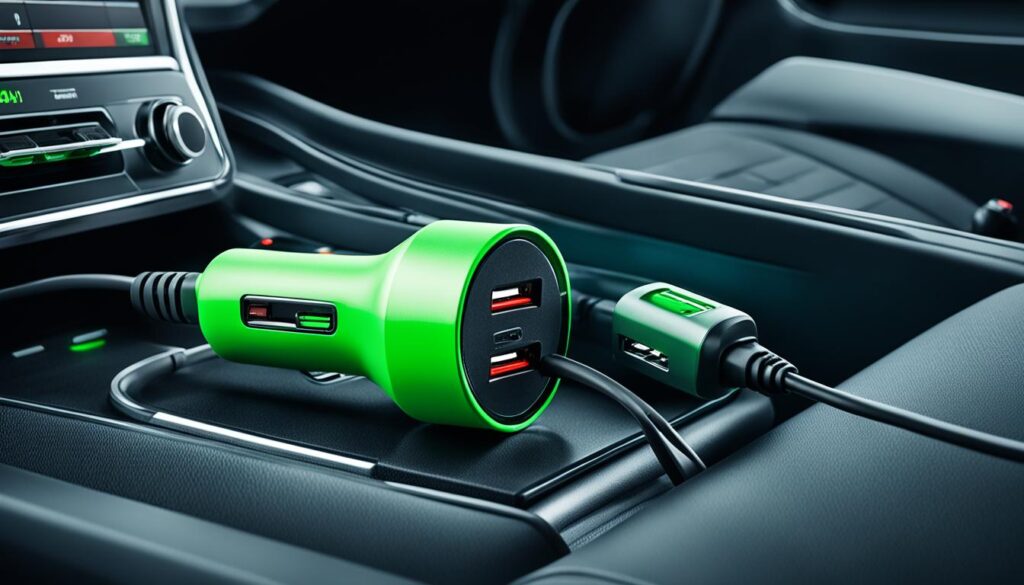
Understanding CCS Connectors for Rapid Charging
CCS connectors, or Combined Charging System connectors, are widely used for rapid DC charging in electric vehicles (EVs). These connectors have become the default standard for many manufacturers and allow for quick charging when away from home.
A CCS socket is typically combined with a Type 2 or Type 1 socket, depending on the region. It’s important to note that Tesla vehicles in Europe also offer a CCS socket, providing flexibility and compatibility with charging infrastructure.
CCS charging stations come in various power outputs, with newer installations offering incredibly fast charging rates of up to 350 kW. This enables EV drivers to recharge their vehicles quickly and efficiently, reducing charging time and allowing for extended journeys.
When considering car charger connector adjustment or DIY charger pin modification, it’s essential to take into account the compatibility of the charging system used in your vehicle. CCS connectors require specific pin configurations to ensure a secure and reliable connection, so any modifications should be done carefully and with proper knowledge or assistance.
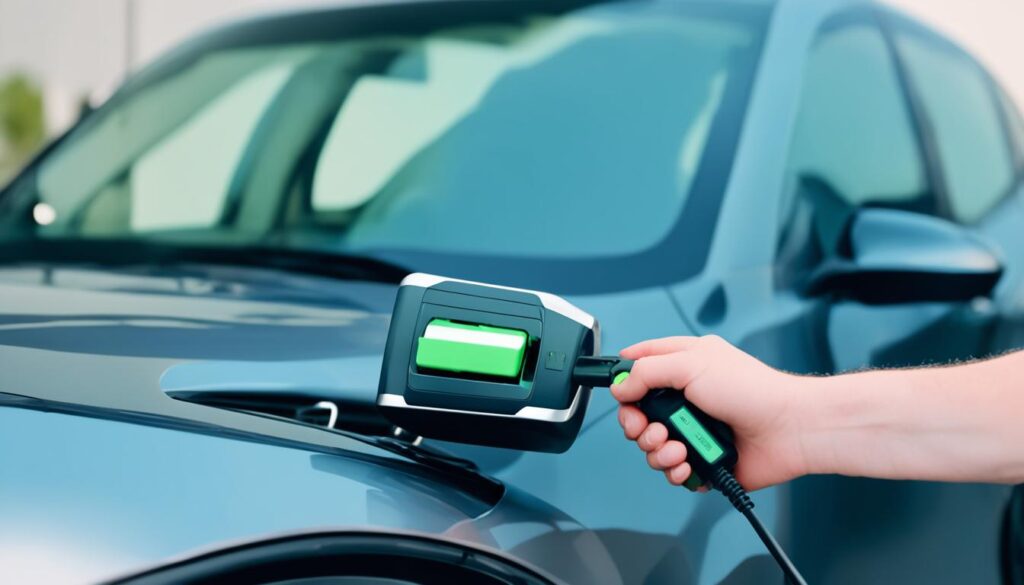
Different Types of EV Charging Cables and Plugs
When it comes to EV charging, understanding the different types of cables and plugs is essential for safe and efficient charging. EV charging cables come in various forms or “modes” depending on the type of charging required.
Mode 1 and Mode 2 Cables
Mode 1 and Mode 2 cables are typically used for light electric vehicles and are not recommended for EVs due to limited safety features. It’s crucial to prioritize safety when charging your EV, and using Mode 1 or Mode 2 cables may pose a risk.
Mode 3 Cables
Mode 3 cables are the most common and connect EVs to dedicated charging stations. These cables offer enhanced safety features and are specifically designed for EV charging. Mode 3 cables provide reliable and secure connections, ensuring a safe charging experience for EV owners.
Mode 4 Cables
Mode 4 cables are designed for rapid charging and can handle higher power outputs. These cables are commonly used for fast-charging stations and enable EVs to charge at a much faster rate compared to other modes. If you frequently rely on rapid charging, investing in a Mode 4 cable is essential to maximize charging efficiency.
EV Charging Plugs
EV charging plugs also vary based on the region and vehicle model. For AC charging, Type 1 and Type 2 plugs are commonly used. These plugs provide a secure connection for charging your EV with AC power sources. As for DC rapid charging, different connectors are utilized. These include CCS1, CCS2, CHAdeMO, and GB/T plugs, each used for specific charging stations and EV models. It’s crucial to ensure you have the appropriate charging plug for your charging needs and vehicle compatibility.
By using the correct charging cable and plug, you can ensure safe and efficient charging for your EV. It’s important to choose the appropriate mode and connector for your charging requirements, taking into account the safety features and power capabilities.
Conclusion
Adapting a large pin charger to a small pin for car charging can be done through various methods, giving EV owners the flexibility to continue using their existing charging equipment without costly replacements.
One option is to use a charger pin adapter, which allows you to convert your large pin charger to a smaller pin size. This adapter can easily be plugged into your car’s charging port, providing compatibility with the smaller pin.
Another method is to modify the car’s charging port itself. This DIY charger pin modification involves resizing the charger pin to match the smaller pin size. However, it is essential to follow safety guidelines and ensure compatibility with the charging system, such as CCS (Combined Charging System), used by your vehicle.
Additionally, using an extension lead can be a temporary solution. While this method may not meet official regulations, it has been used by many EV owners safely. However, it is important to use a good quality extension cable with the appropriate amp rating and regularly inspect for any signs of overheating or damage.
By considering these modifications, you can make your large pin charger for car to a small pin, adjust the car charger connector, or modify the charging port, allowing for continued and convenient charging of your EV. Remember, regular monitoring and inspections of plugs, sockets, and cables are crucial to ensure safe and reliable charging.




